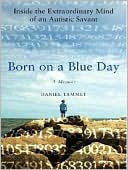

 |

|

The average rating for Born on a Blue Day: Inside the Extraordinary Mind of an Autistic Savant based on 2 reviews is 2 stars.
Review # 1 was written on 2008-11-25 00:00:00 Mr. Uwe Matschke Mr. Uwe MatschkeThe problem with autobiography is that extraordinary people are not necessary good writers. Daniel Tammet has an extraordinary mind - he can visualise numbers, recite pi to record-breaking decimal places and learn languages with astounding ease*. This is linked to his Asperger's and also to epilepsy. Although a novel human story, this does not provide much insight into how Tammet's brain works and why other brains are not like his. I expected his unique cognition would be illuminated through precise examples and that these would shed more light on cognitive psychology. Instead, this is a human interest story and can be only enjoyed as such. *It is interesting that Tammet's rapid language learning is attributed to his uncanny ability to learn and apply rules but no mention is made of his lack of social inhibition, which is a huge stumbling block for adult language learners. |
Review # 2 was written on 2008-01-30 00:00:00 Robert Ross Robert RossWith a full title (in the States) of Born on a Blue Day: Inside the Extraordinary Mind of an Autistic Savant, Daniel Tammet's memoir might seem intimidating. Yet the text itself is anything but--the chapters are relatively short, his sentences are easy to follow, and (aside from the first chapter, "Blue Nines and Red Words") it is told in straightforward chronology. Tammet is 28 years old; he's been diagnosed as both a savant and autistic, which means that he can remember nearly everything he's read, including massive amounts of numbers, but that he spent most of his life feeling like an outsider unsure of how to interact with other people. I first learned of the memoir both through a book review somewhere else and a special on TV about him--in which, among other things, he learned to speak Icelandic fluently in one week. He sees words and numbers as colors and textures, with different characters having different sizes and shapes. I would love to say that it is a brilliant memoir, but to be honest, there were few points where it lived up to the dust jacket's "triumphant and uplifting" description. True, he has been incredibly successful in spite of his autism-related limitations (he runs a successful online language learning business, and is considered one of the most socially functional autistic cases ever studied--as a result, he's a scientist's wet dream to studying the brain, savantism, and autism). While the text is quite informative into how his mind works and what his life has been like, there were large chunks where I felt disconnected from the text. This sense of distance was a result of two elements. First, in the entire book--though most noticeably in the first few chapters--it seems like Tammet and his editors just can't seem to decide what exactly they want this memoir to do. Tammet swings from describing how he sees the world (fairly passionately and intricately) to listing off events of his childhood, to offering somewhat stilted advice to those with autism and their friends and family. Since the advice frequently takes the form of a paragraph awkwardly tacked on at the end of a chapter, I felt like it wasn't really organically grown from the text. Secondly, in many cases, Tammet is simply listing and recounting events. The most engaging passages are where he discusses how he sees certain letters and words, how he learned Icelandic, how he memorized over 22,500 numbers of pi for a public recital, the ins and outs of his relationship, and when he meets Kim Peek (on whom Dustin Hoffman's Rain Man is based). In short, when he's writing about things that matter to him, it's an incredibly engaging memoir. But so much of his recounting has the air of something he's telling us because he expects it's what we're interested in--and that he'd kind of bored by it. As a result, the rest of the memoir is consumed by an almost list-like, fairly dispassionate chronology of his experiences in grade school, secondary school, teaching abroad, etc. In some ways, this second "problem" seems a result of the first: the focus of the text seems torn. The shorter early chapters seem to exacerbate the problem by skipping rather quickly through things--many of them things Tammet does not remember but his parents do, which could account for his lack of energy when discussing them. His is a fascinating mind and experience, and the book is definitely worth reading if you're interested in how the brain works, how autism or savantism work, and particularly how Tammet sees numbers, letters, etc. (he includes illustrations of what some letters and numbers look like to him, which are cool). It does provide a lot of insight into how someone with Asperger's syndrome (considered a milder, more social form of autism) functions and thinks. (The UK title, Born on a Blue Day: A Memoir of Asperger's and an Extraordinary Mind, actually seems more representative of the text itself.) Otherwise, this is one story where the condensed version of the TV special might actually be preferable, as the stilted style in portions of this text rob it of its due. |
CAN'T FIND WHAT YOU'RE LOOKING FOR? CLICK HERE!!!